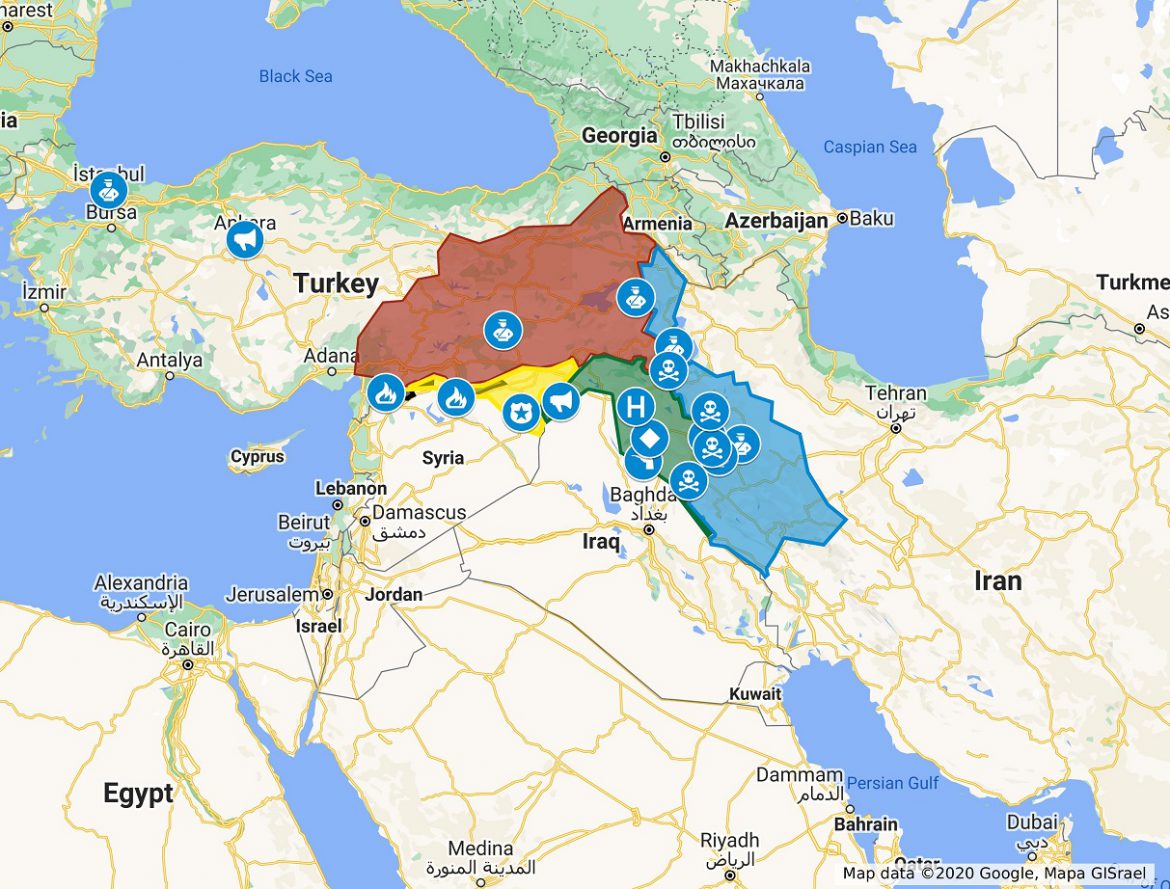1.6K
Iran
- The Iranian regime continued efforts to stifle Kurdish political activity by arresting more activists and imposing additional prison sentences. Urima’s Revolutionary Court sentenced a 17-year-old female named Aynaz Zarae to five years in prison for “disruption of national security” over allegations of membership of a Kurdish opposition party. Zarae’s mother received a 15-year sentence in July. Also, in Urmia, a Kurdish man named Arman Karwanchi was moved to the main prison after being held by Iranian Intelligence officers (Ettela’at) for over a month for being a member of a religious group. At the same time, the trial of a Kurdish journalist named Murtaza Haqbayan, who is accused of leaking official documents exposing the corruption of senior Iranian officials on social media, began in Sanandaj. Meanwhile, Iranian authorities arrested two Kurdish men named Iqbal Shamshiri and Erei Waissi in Paveh (Paweh). Lastly, Ettela’at officers arrested six Kurds in Piranshahr for “violence against security forces.”
- The Kurdish border porters known as Kolbars suffered more casualties at the hands of the Iranian regime last week. Iranian border guards killed a Kolbar named Saadi Rostamzada in the Hawraman region last Tuesday and two more named Wasim Fardinzada and Hakan Mohammedzada in Oshnavieh (Shinno) on Wednesday and Thursday. Furthermore, Islamic Republic of Iran Army (Artesh) artillery strikes killed a Kolbar named Yahya Saman near Saqqez. Simultaneously, a Kurdish shepherd found the corpse of a Kolbar named Murtaza Azizi, who was previously missing for four months, near the Iran-Iraq border in Kermanshah Province. Finally, another Kolbar was killed by a mine from the Iran-Iraq War near Shinno on Saturday.
Iraq
- The Government of Iraq (GOI) deployed three federal police brigades to the Yazidi town of Sinjar (Shingal) as part of ongoing efforts to implement a security agreement with the Kurdistan Regional Government in Iraq’s “Disputed Territories.” Concurrently, the Yazidis elected a new spiritual leader, Ali Elias Haji Nasr, to replace Khartu Hajji Ismael, who passed away in October.
- ISIS (Da’esh) terrorists continued to exploit the fragile security situation in the “Disputed Territories” last week by killing at least eight civilians and security forces personnel near Salahadin Governorate’s border with Kirkuk Governorate. That said, the Iraqi Counter Terrorism Service (CTS) killed 12 Da’esh operatives during a raid in the Zaghaitun Chai. Moreover, several media reports claimed Prime Minister of Iraq Mustafa al Kadhimi will transfer the Iraqi military’s responsibility for security inside Kirkuk city to local law enforcement entities. Iraq’s Kurds have demanded this change since the GOI imposed martial law on the city in response to the Kurdish independence referendum on October 16, 2017.
- Erbil’s governor, Firsat Sofi, succumbed to the coronavirus last week. Iraqi Kurdistan’s coronavirus numbers now stand at 94,421 confirmed cases, 3,036 deaths, 33,069 active cases, and 58,316 recoveries.
Syria
- Clashes between Turkish proxies and the Syrian Democratic Forces (SDF) intensified near Ain Essa last week. Turkish forces and their proxies launched several indirect fire attacks on locations near Ain Essa and the strategic M4 Motorway that wounded at least five civilians. Turkey also shelled SDF positions near Giri Spi (Tal Abyad). Concurrently, the Syrian Observatory for Human Rights (SOHR) reported an SDF ambush near Ma’laq village, which the SDF withdrew from on Monday, killed 21 Turkish-backed fighters. Last week’s clashes occurred despite the Russian-Turkish agreement establishing a “safe zone” in the region following the October 2019 US withdrawal.
- The US-led Global Coalition to Defeat ISIS reaffirmed its commitment to the SDF on Tuesday. Meanwhile, the SDF showcased its ongoing role in the fight against Da’esh by carrying out several coalition-supported raids on Da’esh positions in Deir Ez Zor Governorate and capturing eight terrorists in Tal Hamis, As Shadadi, Aazba, and Harja.
- Turkish-occupied areas of Syria remain plagued by deteriorating security situations, as two car bombs in Afrin and al Bab killed eight civilians and injured dozens more. Turkish proxies in the occupied zones periodically engage in disputes over funding and control of criminal rackets that sometimes result in armed conflict.
Turkey
- The Turkish government launched one of its most aggressive arrest campaigns of the year against Kurdish activists and politicians last week. Turkish authorities arrested 11 Kurds in Van Province’s Ozalp District, six of whom remain in jail. Likewise, Diyarbakir’s public prosecutor issued 101 warrants, most of which were against members of the Democratic Society Congress (DTK), on Friday. The issuing of the warrants was followed by multiple raids targeting Kurds, lawyers, and activists throughout Turkey, most of whom were detained in Diyarbakir, Istanbul, Izmir and Adiyaman. Turkish police then detained 19 people who were protesting the original arrest campaign on Saturday in Istanbul. Most of those arrested were charged with “membership of a terrorist organization.”
- A Turkish court in Diyarbakir sentenced Peoples’ Democratic Party (HDP) member Eshref Mamedoglu to ten years and seven months in prison for “spreading terrorist propaganda” and “membership of a terrorist organization.” At the same time, Human Rights Watch called on the Turkish government to immediately release the jailed Kurdish politician Selahattin Demirtas and described the Turkish government’s imprisonment of Demirtas and HDP lawmakers as an “ongoing assault on the HDP and part of a broader pattern of politically motivated prosecutions.” The Turkish government previously rejected a 2018 ruling from the European Court of Human Rights that called for Demirtas’s release.

